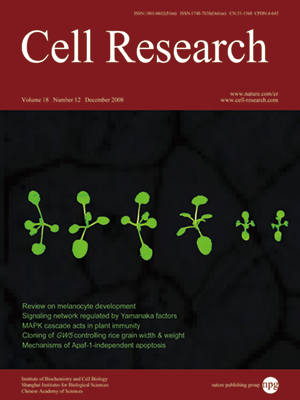
Volume 18, No 12, Dec 2008
ISSN: 1001-0602
EISSN: 1748-7838 2018
impact factor 17.848*
(Clarivate Analytics, 2019)
Volume 18 Issue 12, December 2008: 1190-1198
ORIGINAL ARTICLES
MEKK1, MKK1/MKK2 and MPK4 function together in a mitogen-activated protein kinase cascade to regulate innate immunity in plants
Minghui Gao1,2,*, Jinman Liu1,2,*, Dongling Bi2, Zhibin Zhang2, Fang Cheng2, Sanfeng Chen3 and Yuelin Zhang2
1College of Biological Sciences, China Agricultural University, Beijing 100094, China;
2National Institute of Biological Science, Zhongguancun Life Science Park, 7 Science Park Road, Beijing 102206, China;
3State Key Laboratories for AgroBiotechnology, China Agricultural University, Beijing 100094, China
Correspondence: Yuelin Zhang,(zhangyuelin@nibs.ac.cn)
Mitogen-activated protein kinase (MAPK) cascades play important roles in regulating plant innate immune responses. In a genetic screen to search for mutants with constitutive defense responses, we identified multiple alleles of
mpk4 and
mekk1 that exhibit cell death and constitutive defense responses. Bimolecular fluorescence complementation (BiFC) analysis showed that both MPK4 and MEKK1 interact with MKK1 and MKK2, two closely related MAPK kinases.
mkk1 and
mkk2 single mutant plants do not have obvious mutant phenotypes. To test whether MKK1 and MKK2 function redundantly,
mkk1 mkk2 double mutants were generated. The
mkk1 mkk2 double mutant plants die at seedling stage and the seedling-lethality phenotype is temperature-dependent. Similar to the
mpk4 and
mekk1 mutants, the
mkk1 mkk2 double mutant seedlings accumulate high levels of H
2O
2, display spontaneous cell death, constitutively express
Pathogenesis Related (PR) genes and exhibit pathogen resistance. In addition, activation of MPK4 by flg22 is impaired in the
mkk1 mkk2 double mutants, suggesting that MKK1 and MKK2 function together with MPK4 and MEKK1 in a MAP kinase cascade to negatively regulate innate immune responses in plants.
Cell Research (2008) 18:1190-1198. doi: 10.1038/cr.2008.300; published online 4 November 2008
FULL TEXT | PDF
Browse 2102


